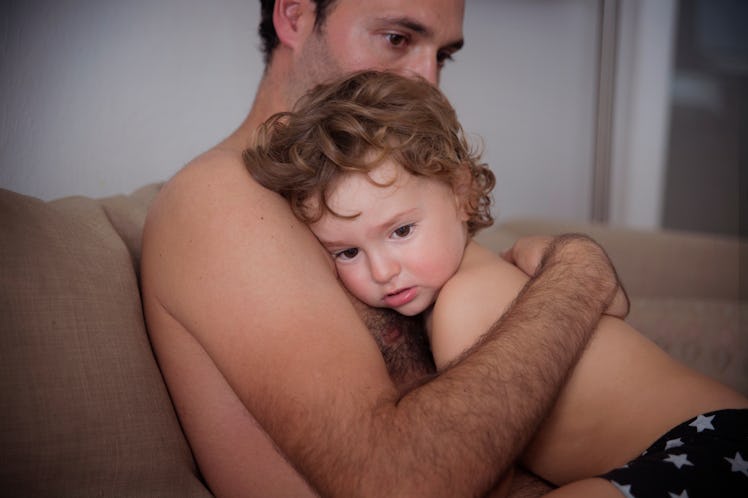I Tried To Be A Traditional Patriarch And Failed Miserably
For one day, I stopped being an engaged father and husband. I hated it.

I’ve been thinking of Mr. George Banks, Edwardian money manager, father of two, and employer to Mary Poppins. I’ve been thinking about Mr. Banks because I’m not Mr. Banks, and sometimes I wish I were.
Let me explain. George Banks has a very well-defined parenting style. He believes in firm discipline and the exercise of parental power. He explains in song that he expects to be relaxing with his slippers and sherry when he gets home from the bank. He expects to spend roughly three minutes with his children before sending them off to bed.
And that’s where I get jealous. I love my kids, but that sounds…relaxing. It also sounds totally untenable. My kids have other expectations and, more importantly, so does my wife. I’m not the lord of my castle. I just live there.
But I had an idea. My birthday was looming, so I figured I’d ask for a very specific present: obedience. I suggested that everyone spend a day pretending to care what dad wants, and — largely because it saved money on gifts — my family agreed.
I got to be Mr. Banks for a day.
You’d be right to guess that I took full advantage of it. The world was mine. I was the white man-iest white man on the block. Privilege positively oozed from my pores as I paused, robe-clad in the hall, to consider my own desires. My children, I knew, would honor my wishes, and my wife would do as I asked. Eyes would roll, but I could look past that. I was, after all, the patriarch.
What did I do? I went to get a haircut and talked proudly about my perfect children. Then I called my wife to let her know I was going to lunch, and I completely ignored the sounds of my boys screaming at each other in the background. I was consciously unconscientious. I did my very best to ignore the strain in my wife’s voice.
I made it about halfway through my meal — way too much bacon and fried eggs — before I lost momentum. I’d been a Banksian father figure, remote and unreachable, for all of 12 hours, and I was already beginning to feel like an asshole. I thought again about Mr. Banks. Why was he so happy? Why was he so full of song? And the truth came to me: Mr. Banks wasn’t happy because he had all the power; Mr. Banks was happy because he didn’t think about other people. Selfishness begets a very specific genre of joy among the upwardly mobile and acquisitive. Mr. Banks thought he was winning.
I was not so sure. From where I was sitting among the defining elements of my life — love of my children, deep respect for my wife, professional uncertainty, empathy, self-doubt, and what I’d like to think of as a decent bit of perspective — the view of the scoreboard was obscured. How foolish I was, I thought, for envying a myopic man.
Then I thought about Mr. Banks and how we were different. That made me feel better until I tried to innumerate our different traits and came to a rather abrupt and seemingly premature stop.
Mr. Banks is blithely dismissive of his wife. Me too. There have been plenty of times in the past few years where I’d demonstrated a Banksian disregard for my wife’s concerns. On several occasions, I’ve looked up from my phone and found myself mid-conversation with my wife with no idea what she was talking about.
“Oh, that’s nice dear,” I’d say, assuming everything would be fine.
And how many times had I done the equivalent of telling my kids their hopes were nonsense? How many times had they made a reasonable request only to have me give the equivalent response of throwing it into the fire?
“Poppa, I’d really like to have some friends over this weekend so we can play Minecraft,” my 7-year-old son requested recently. My response? No. Why? No reason.
After I paid my lunch bill, I went to my cold car and sat in the driver’s seat looking at the gray strip-mall parking lot. I was feeling increasingly emotional. I didn’t feel powerfully remote; I felt alone. I had realized that although I’ve always imagined myself to be the reformed kite-flying Mr. Banks, I’ve spent much of my life as the pre-Poppins boor. My mistake in starting the experiment was in thinking that being Mr. Banks would be a nice break from my more modern reality. It really wasn’t, and that was a tough pill to swallow.
But I guess the magic of Mary Poppins is that, in the end, we are reminded that we can change. It’s not that I was going to go home and fly a kite with my kids. It was too cold, after all. But I realized that when I did get home, I wanted to be with them. That’s what I really wanted. I wanted to hang out and listen to them and play. I wanted to cuddle with my wife and make her smile. I wanted to be silly.
And when I walked back in through my door, that’s what I did. I think Mary Poppins would have approved. But she didn’t know how to play Minecraft.
This article was originally published on